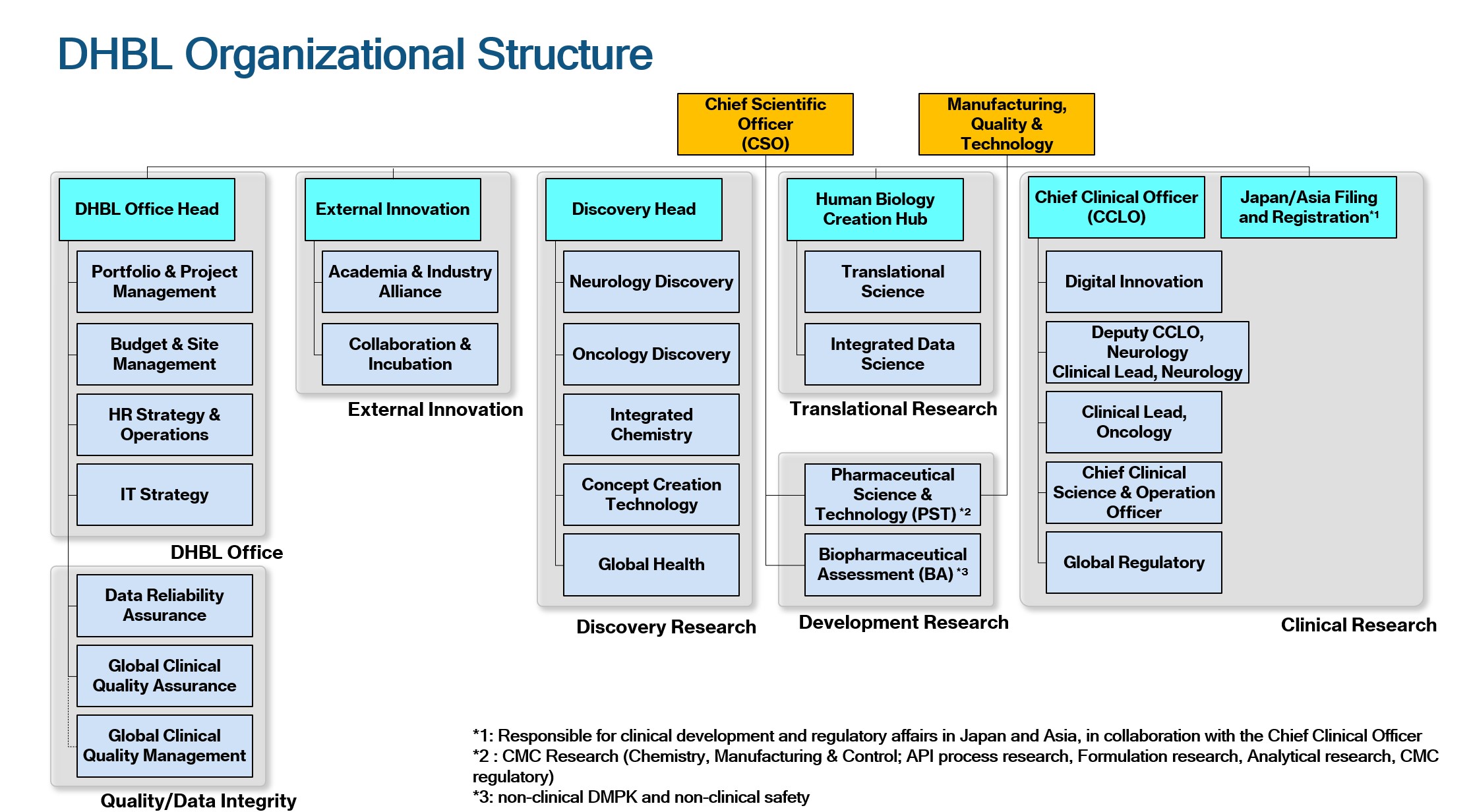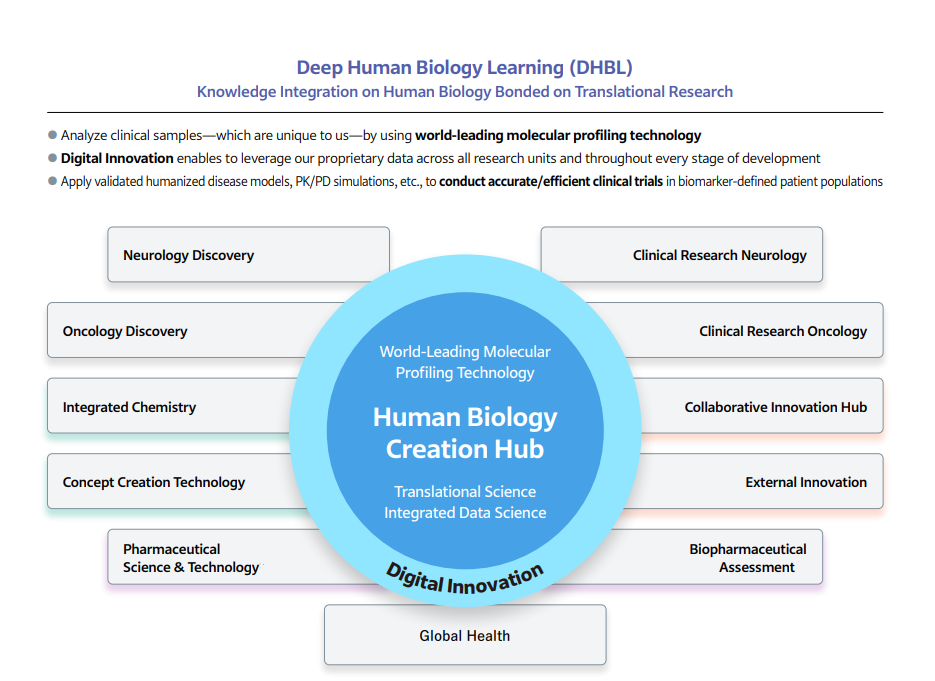Advances in biology, information, and digital technologies are changing the concept of disease by elucidating the changes that occur in the healthy body before the onset of disease. In the midst of these changes, in order to correctly understand disease conditions and create treatments, it is important to view disease as a continuum (Disease Continuum) rather than just understanding the onset and progression of the disease, and to deeply understand the biological changes within the body (Human Biology), such as genome information, cellular mechanisms, and pathophysiology, that are linked to the root causes. Therefore, from July 2022, we have reformed our R&D organization to Deep Human Biology Learning (DHBL) with the intention of shifting to a drug discovery approach based on Human Biology, starting from our own unique clinical data.
A Message from our Chief Scientific Officer
(Vice President Katsutoshi Ido)

Eisai boasts a drug discovery history of over 40 years in the fields of neurology and oncology. By engaging in over 500 annual hhc activities, we develop a deep sense of empathy towards patients' genuine needs. These experiences have inspired our researchers to contribute to patient well-being, resulting in the creation of innovative, in-house developed new drugs such as Aricept, Fycompa, and Dayvigo in the neurology field, and Halaven, Lenvima, and Tasfygo in the oncology field. Our strong leadership and commitment to the hhc concept have fostered unique drug discovery activities, including a dedication to drug discovery concepts underpinned by non-clinical pharmacology models, our commitment to developing any therapeutic modality, biomarker research utilizing the latest molecular profiling techniques, and conducting clinical studies in appropriate patient populations. This has enabled us to deliver the early Alzheimer's disease (AD) treatment Leqembi to patients. Leqembi is believed to bind to Aβ protofibrils, a toxic form of amyloid beta (Aβ) implicated in the pathology of Alzheimer’s disease, reducing both Aβ protofibrils and amyloid beta plaques in the brain. As a result, this treatment is expected to slow the progression of mild cognitive impairment and mild dementia due to Alzheimer's disease.
Overview of DHBL Organizational Structure
In October 2022, the DHBL (Deep Human Biology Learning) organizational structure was launched. The reorganization resulted in thorough scientific discussions based on Eisai’s unique human biology data, facilitating the efficient utilization of common platform technologies. In April 2025, by leveraging the benefits of our DHBL organizational structure, we decided to reform our organizational structure (Figure 1) to further promote DHBL drug discovery and development based on human biology, with an emphasis on enhancing communication, accelerating decision-making processes, and effective resource utilization.

In the new organizational structure, the “Human Biology Creation Hub” (Figure 2) has been established under the Chief Scientific Officer. This function will play a crucial role across drug discovery, development, and clinical research. Its objectives include the construction and validation of new drug discovery hypotheses, enhancing collaboration between non-clinical and clinical research, accelerating clinical study programs while improving success rates, and further facilitating social implementation of diagnostic technologies through cooperation with our medical departments. Moreover, a “Digital Innovation” division has been established within the Clinical Research Function to accelerate the creation of Eisai's unique drug discovery concepts. This acceleration will be achieved by strengthening research and development IT, improving the AI (Artificial Intelligence)/ML (Machine Learning) environment, and maximizing the use of human biology data obtained from clinical studies.

Our discovery research focuses on two therapeutic areas, neurology and oncology, as well as global health, aiming to accelerate discovery projects and rapid clinical implementation. To achieve these goals, the creation and validation of highly promising drug discovery hypotheses is repeatedly conducted through close collaboration among the Neurology Discovery, Oncology Discovery, and Global Health teams, which are comprised of biologists, the Integrated Chemistry team in which medicinal chemists utilize cutting-edge technologies including AI/ML and structural biology, and the Concept Creation Technology team, responsible for advanced modality research for drug discovery and development of experimental validation technologies. To continuously create innovative new medicines, we actively integrate cutting-edge technologies from external sources such as academia and startups through external innovation activities. Simultaneously, the DHBL office leads the development and implementation of clear portfolio strategies and ensures the timely optimization of resource allocation.
This new structural management will foster an organizational culture that embraces taking risks with challenges that are both innovative and progressive, as well as early-stage decision-making with sound scientific principle, thereby promoting increased morale and growth of our researchers. We will continue to drive DHBL drug discovery forward based on human biology with our robust drug discovery promotion system, underpinned by strong leadership and our belief in the hhc concept. With this, we are committed to delivering innovative new medicines efficiently and continuously to patients and the people in the daily living domain, and contributing to relieving anxiety over health.

